Audrey Creel came to MTSU with an enthusiasm for digital history.
Through earning one of the university’s Undergraduate Research Experience and Creative Activity, or URECA, grants, Creel turned that interest into funding for a research project she completed with help from her professor Molly Taylor-Poleskey.
Administered through the Undergraduate Research Center, which is part of the Office of Research and Sponsored Programs, the grant gave Creel the freedom to pursue her passion outside of the classroom.
“Bygone Nashville was a project in digital public history,” Creel explained. “I had expressed interest in this subject by registering for a course in digital history the semester before, and URECA allowed me the opportunity continue this research.”
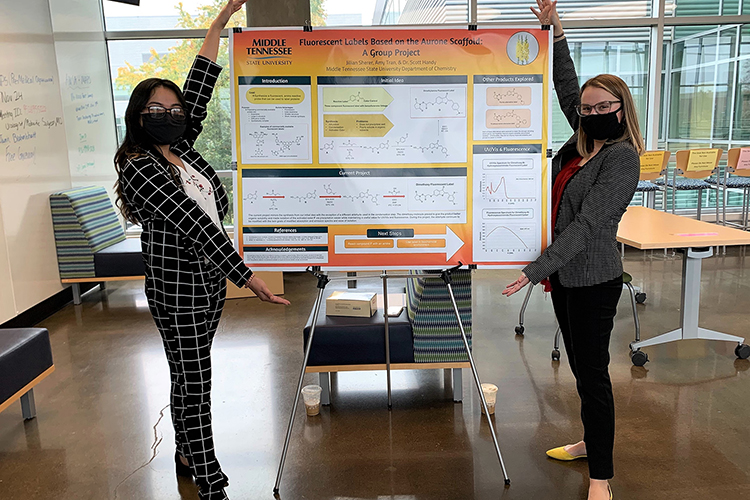
Middle Tennessee State University Undergraduate Research Experience and Creative Activity grant students Amy Tran, left, and Jillian Sherer, right, shared their research project at the Undergraduate Research Open House on the Murfreesboro, Tenn., campus at the Science Building mezzanine on Nov. 10, 2020. (MTSU photo by Casey Penston)
MTSU undergraduates can earn a $500 to $3,500 URECA grant depending on their level of experience and the time they intend to commit to the project.
“Every student on MTSU’s campus, regardless of their prior experience with research or a creative project, has the potential to become an undergraduate research scholar,” said Jamie Burriss, ORSP program manager and principal staff for the URC. “MTSU commits $130,000 annually to undergraduate research and creative activity. We offer these (grants) three times a year: fall, spring and summer.”
“Not only do we fund research projects, but we fund creative activity projects,” Burriss added. Creative projects include art, performance, literature and others in the liberal arts field.
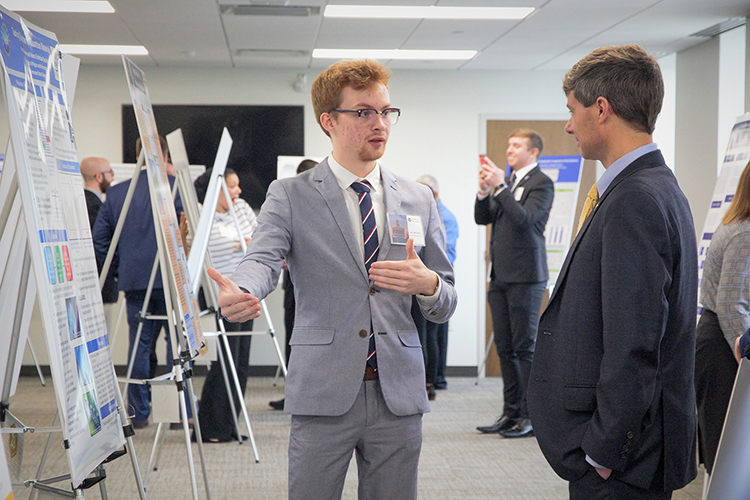
Middle Tennessee State University Undergraduate Research Experience and Creative Activity grant student Aric Moilanen, left, shares his research with Tennessee state Rep. Charlie Baum, right, at the Posters at the Capitol event in February 2020 at the Cordell Hull Building in Nashville, Tenn. (MTSU photo by Casey Penston)
“(URECA grant students) get to work with an inspiring faculty mentor, spend time with other undergraduate researchers and attend awesome events and conferences,” said Casey Penston, ORSP program assistant. “It will act as a springboard for your (students’) research interests as well as building skills needed for success.”
Starting the URECA application process involves the submission of an application, a proposal, a detailed project timeline and an unofficial transcript, explained Emily McTyre, a video and film production student, in the center’s URECA grant workshop video.
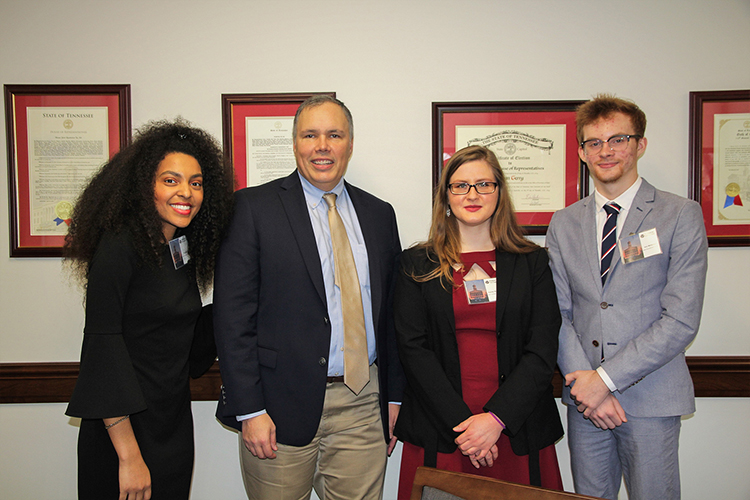
Middle Tennessee State University students Tia Shutes, left, Kayley Stallings, center, and Aric Moilanen, right, pose with Tennessee state Rep. Bryan Terry at the Posters at the Capitol event in February 2020 at the Cordell Hull Building in Nashville, Tenn. The students were participants in the university’s Undergraduate Research Experience and Creative Activity grant program. (MTSU photo by Casey Penston)
Another key piece of applying for a URECA grant? Students need to have a faculty mentor.
Finding a faculty mentor
Mark Abolins, URECA chair and geosciences professor, first got involved with the program in the early 2000s and became the chair in fall 2020. His interest in URECA stemmed from mentoring undergraduate researchers who needed funding for grants outside of narrow fields of study.
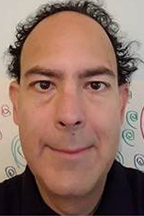
Dr. Mark Abolins
“URECA provides the flexibility that many seek,” he said. In addition, “Undergraduate research adds much to the student experience and student learning.”
Abolins said the best way for students to get involved with the program is to work with a professor to develop a proposal.
“A student can seek out a faculty member who shares an interest,” Abolins said. “Also, if a student is taking a class or has taken a class from a professor, the student might consider working with that professor to develop URECA proposal ideas.”
Approaching a professor may seem intimidating, but Molly Taylor-Poleskey, assistant professor of history, said that professors are thrilled to connect with their students.
“There is no wrong way to approach a professor,” she said. “Email, stopping after class, anything. A professor’s job first and foremost is to connect with you and form relationships…. (Show) your interest in whatever the professor is teaching about. That’s the best form of flattery you can give and a good foundation for forming a long-term relationship.”
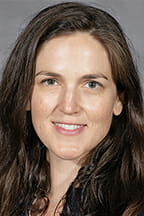
Dr. Molly Taylor-Poleskey
She explained that the mentor-mentee research relationship is not one-sided: it is symbiotic.
“Professors, we may be doing you a little bit of a favor, but we get a lot out of it, too. We get to have your help on our research project and in explaining why our research matters…. You guys get to work together to maybe have a leap forward in your research project that you wouldn’t have had if you didn’t have the other person working on the project with you. Don’t think of it as ‘I don’t know if I can approach them. I’m taking their time.’ It’s a relationship, and it goes both ways.”
Taylor-Poleskey also highlighted the wide-ranging benefits of pursuing undergraduate research at MTSU through the URECA grant.
“The URECA grant gives them (students) that financial support to delve into their academic interests rather than taking a job that won’t serve them in their careers later on,” she said.
“MTSU has this really wonderful quality about it that we’ve got this wide variety of majors. A student here — this has been my experience as a faculty member — can take advantage of that by combining with people in other departments to create really cool research projects…. We couldn’t have done that at another university.
“First of all, I don’t know of another university that has that wide variety of practical and theoretical degrees. Second, I’ve found that those students and faculty in those departments are actively looking for those collaborations.”
‘My mentor walked beside me’
Creel, a Murfreesboro native and recent MTSU history graduate, said working with Taylor-Poleskey on her URECA grant project was a critical aspect in its success.

Audrey Creel
“I learned how to research, format and plan alongside other public history scholars to create a public, online exhibit,” Creel said. “I was able to further my skills in digital history and build a website to host an online exhibit in partnership with Oaklands Mansion. Prior to my work with URECA, this would not have been possible.”
Echoing the faculty advice, Creel suggested students reach out to professors in their fields of study.
“The best way for students to get involved is to ask questions and make connections with professors in their desired field of research and study,” Creel said. “By showing a deeper interest in both the subject matter and opportunities to further one’s knowledge in their field, the URECA (grant) presents itself as a viable method to further one’s research.”
Just as Taylor-Poleskey explained, the mentor-mentee relationship is reciprocal. Taylor-Poleskey benefited from help with her Bygone Nashville project, and Creel received support and experience through conducting a research project.
“My mentor helped me define my research goals into a full project that could be completed over the course of the semester,” Creel said. “Through regular meetings, my mentor asked me questions to refocus or strengthen my research. My mentor walked beside me and helped me correct any errors I made during the process. My mentor also was readily available to answer any questions I had while conducting my research.
“A mentor is there to guide mentees toward growing their research and creating a strong final product.”
To learn more about the URECA grant or to apply, visit the website. The next URECA grant application deadline is March 25 at 4:30 p.m. for summer semester funding.
— Stephanie Barrette (Stephanie.Barrette@mtsu.edu)
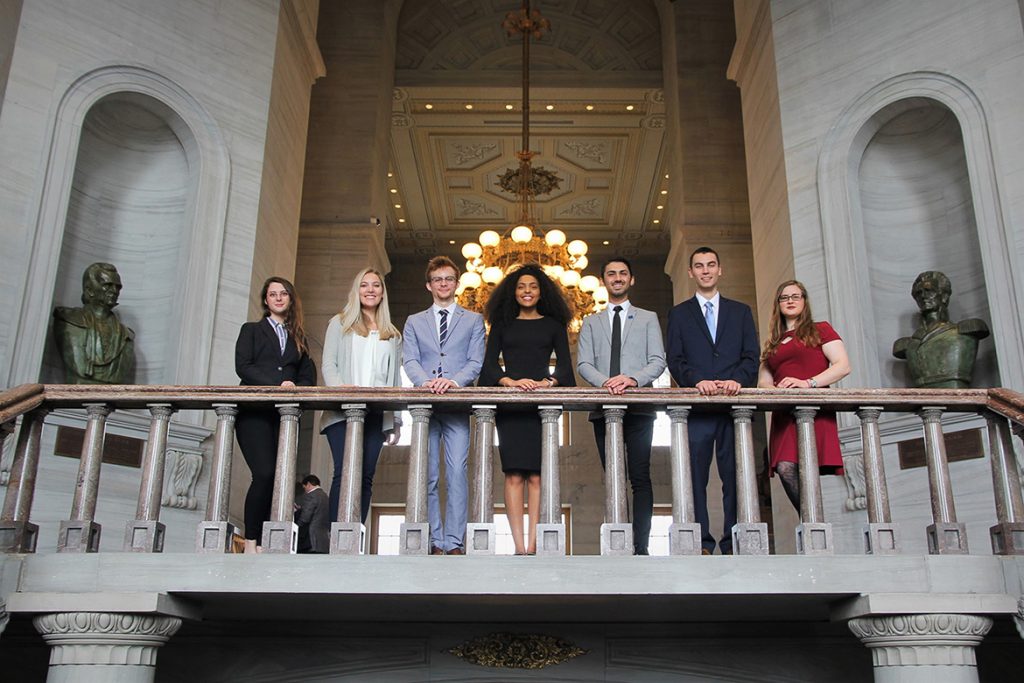
Middle Tennessee State University Undergraduate Research Experience and Creative Activity grant students attended the Posters at the Capitol event in February 2020 to share their research projects with state representatives and stopped for a photo in the Tennessee Capitol in Nashville, Tenn. Standing, from left, are Lily Medley, Lillian Beck, Aric Moilanen, Tia Shutes, Dirhat Mohammad, Jared Frazier and Kayley Stallings. (MTSU photo by Casey Penston)

COMMENTS ARE OFF THIS POST